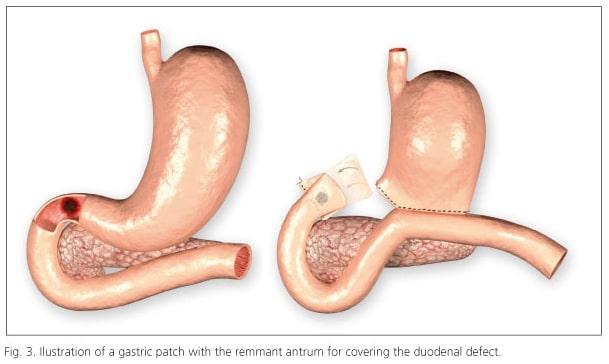Causes and Symptoms of Duodenal Ulcer
A duodenal ulcer is a sore that forms in the lining of the duodenum. Your duodenum is the first part of your small intestine. This is the part of your digestive system that food travels through after it leaves your stomach. Digestion starts from the small intestines, of which the duodenum is the first part of the small intestines. That’s why you need to know the causes and symptoms of Duodenal Ulcer to avoid its unwanted late complications.
What causes duodenal ulcers?
Your stomach makes a strong acid that helps you digest food and kills germs. The cells of the stomach and duodenum make a barrier from mucus, to protect themselves against this acid. If the mucus barrier is damaged, an ulcer can form.
The main cause of this damage is infection with bacteria called Helicobacter pylori, or H. pylori.
The bacteria can cause the lining of your duodenum to become inflamed and an ulcer can form.
Some medications can also cause duodenal ulcers, particularly anti-inflammatory medicines such as ibuprofen and aspirin.
See also: Various Foods That Worsen Stomach Ulcer [Nurses Diaries]
You need to know the causes and symptoms of Duodenal Ulcer because there are some lifestyle factors that may make you more likely to get a duodenal ulcer, such as
1. smoking
2.drinking a lot of alcohol
3. experiencing stress
4. Starving
However, these things are less important than infection with H. pylori.
What are the symptoms of a duodenal ulcer?
If you have a duodenal ulcer, you might:
1. have pain in your stomach or abdomen
2. have indigestion
3. Have epigastric pain
4. feel very full and bloated after eating
5. Have upper back pain
6. feel like you might vomit (nauseous)
7. Weight gain
8. Your stomach pain may come and go. It can often be relieved by eating or taking an antacid.
9. Heart burns
10. Belching
How are duodenal ulcers treated?
If your ulcer is caused by H pylori, the usual treatment is ‘triple therapy’. This involves taking 3 antibiotics and other medicines. The antibiotics kill the bacteria, while the medicine reduces the acid made by your stomach.
If you don’t have an H. pylori infection, and you have been using anti-inflammatory drugs, you will need to stop taking them (if possible). You will also need to start taking a drug to reduce the acid production in your stomach.
You can make some other changes to improve your symptoms, such as:
1. taking antacid.
2. drinking less alcohol
3. losing weight if you are overweight
4. quitting smoking
Relief can also come by reducing your intake of:
1. hot drinks
2. fatty foods
3. spicy foods
4. acidic foods such as tomatoes, lemon, pineapple, star fruit.
Very occasionally, an ulcer can cause serious complications. Go to the emergency department if:
You have a sharp pain in your stomach that doesn’t go away.
Your vomit or stools (poo) look bloody or a black colour.
To be informed about relevant information
About Author
Join our social media platforms
Join Educative News Room for regular updates about related topics
Join Telegram or Join WhatsApp or Join Facebook or Join Twitter(X)
